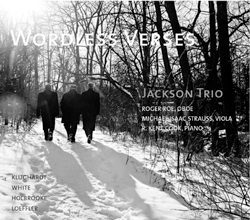by Daniel Hathaway

And what interesting verses these four composers have set to wordless music. For the five fantasy pieces in his 1872 cycle Schilflieder (“Song of the Reeds”), Klughardt turned to poetry by Nikolaus Lenau — whose writings fueled the imaginations of Franz Liszt (Faust), Richard Strauss (Don Juan), and Alban Berg (Seven Early Songs).
Felix White, who served as keyboardist for the London Symphony in the first half of the 20th century, went back to the 17th-century English metaphysical poet Andrew Marvell for his wordless setting of The Nymph’s Complaint for the Death of her Fawn (1921), which is actually a reflection on human inconstancy.
Edgar Allen Poe was a favorite of Josef Holbrooke, an English pianist and composer who based more than 30 compositions on the Baltimore poet’s fantastical works. Holbrooke’s 1917 Nocturne is based on Poe’s Fairyland (an eerie place full of unsettling imagery).
The best-known composer on this album is the German-born Charles Martin Loeffler, longtime assistant concertmaster with the Boston Symphony, whose Trois Rhapsodies on poems by Maurice Rollinat were originally meant to be sung. Loeffler denuded two of them of their words, resulting in the truly wordless Deux Rhapsodies (1901). Here, the chilling verses paint images of a pond populated with “aged fish struck blind” (in L’Étang) and a bagpiper of death whose cries are “like a woman’s agony” (in La Cornemuse).
Needless to say, this colorful and often neurotic poetry inspired the four composers on this album to write some evocative — and often quite beautiful — music. Roe, Strauss, and Cook play this unusual repertoire with excellent ensemble, and beautiful, expressive tone and phrasing in their solo moments. Engineer Ryan Miller caught their warm playing vividly at sessions in Clonick Hall at the Oberlin Conservatory.
Having presumably used up most of the available pieces for oboe, viola, and piano in assembling this striking album, perhaps the Jackson Trio will persuade some of today’s composers to craft other “wordless verses” for the ensemble. Who needs words when the playing is this poetic all by itself?
Published on ClevelandClassical.com December 13, 2016.
Click here for a printable copy of this article


